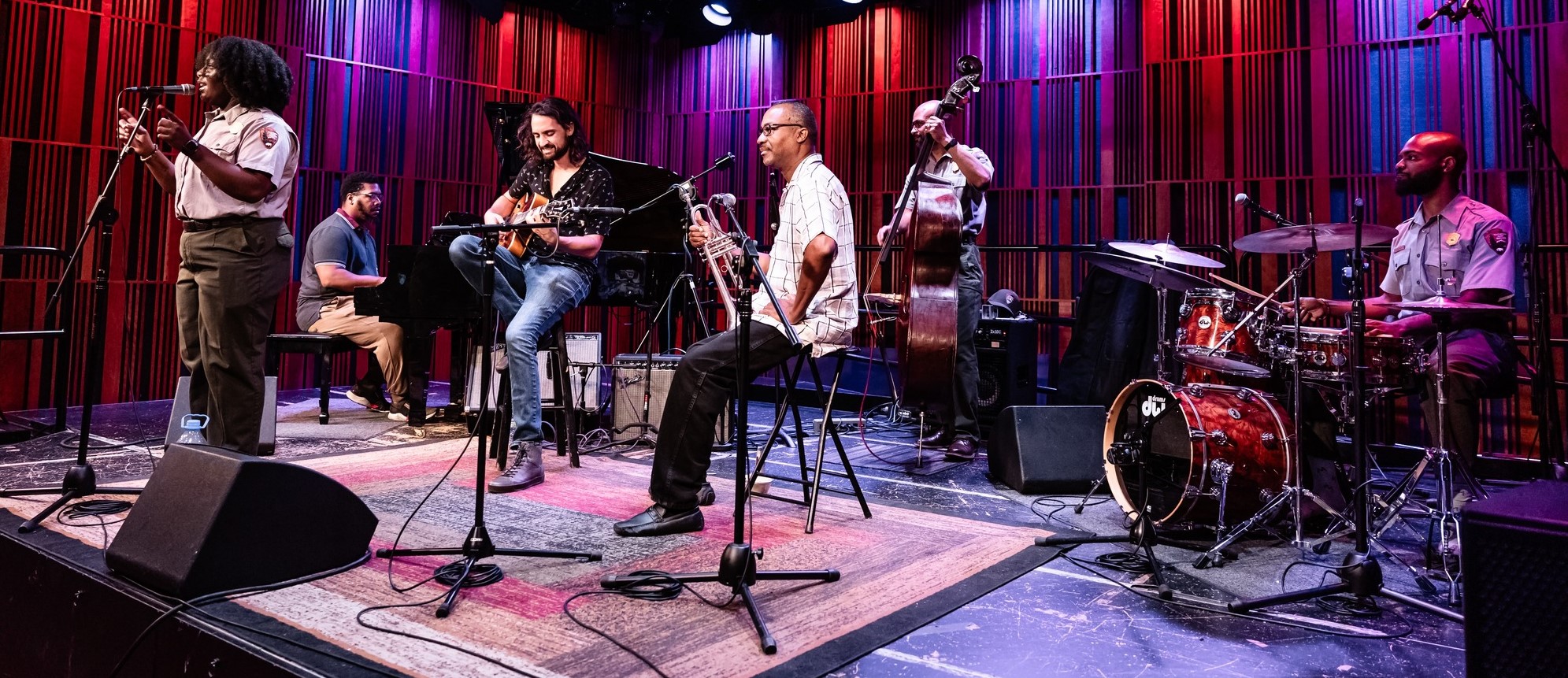News Release

Photo credit- Edward R. Carter
News Release Date: February 1, 2024
Contact: NewsMedia@nps.gov
Washington – Follow the sweet sounds of jazz flowing through the French Quarter and you might just find a park ranger as its source. During Black History Month, New Orleans Jazz National Historical Park and national parks throughout the country are celebrating the 2024 theme of African Americans and the Arts with concerts, dance performances, craft demonstrations, art exhibitions, and poetry readings.
“To tell a complete history of America, we must amplify the voices and contributions of previously hidden figures,” said National Park Service Director Chuck Sams. “Black History Month programs and activities increase awareness of the challenges and achievements of African Americans through the years and celebrate Black joy.”
In the last eight years, eight new national parks with direct connections to the African American experience have been established – Harriet Tubman National Historical Park, Birmingham Civil Rights National Monument, Freedom Riders National Monument, Camp Nelson National Monument, Reconstruction Era National Historical Park, Medgar and Myrlie Evers Home National Monument, New Philadelphia National Historic Site, and Emmett Till and Mamie Till-Mobley National Monument. They join dozens of other national parks that highlight aspects of African American culture and history.
Some of the National Park Service events celebrating African Americans and the Arts include:
- Black History Month Celebration at African Burial Ground National Monument
- Boston National Historical Park cosponsors Boston’s Black Musical History
- Dunbar and Music: Paul's Collaborations into Popular Music at Dayton Aviation Heritage National Historical Park
- Frederick Douglass and the Arts Tour at Frederick Douglass National Historic Site
- Frederick Douglass Birthday Commemoration
- Iron Riders: A Living History Demonstration at Gateway Arch National Park
- Art and Essay Contest at George Washington Carver National Monument
- African Myths and Folk Tales at Mary McLeod Bethune Council House National Historic Site
- Art and Inspiration Programs at New Bedford Whaling National Historical Park
- Multiple concerts at New Orleans Jazz National Historical Park
- Social Justice Music and Poetry at Selma to Montgomery National Historic Trail
- Shadows in the Range of Light: How Buffalo Soldier History in our National Parks can Change the World at Yosemite National Park
Additional sites related to the National Park Service that feature facets of art include:
- Carter G. Woodson Home National Historic Site – Woodson is known as the “Father of Black History” for his writings and efforts to promote the study of Black History as an academic and scientific field. Prior to that time, there was very little accurate written history about the lives and experiences of Americans of African descent. In 1926, he created Negro History Week which has evolved into Black History Month. His home is also the headquarters for the Association for the Study of African American Life and History (ASALH).
- African American Civil Rights Network – The network includes Mitchell Jamieson’s mural commemorating opera singer Marian Anderson's famous performance in front of the Lincoln Memorial.
- The Apollo Theater – Listed in the National Register of Historic Places, the theater is historically and architecturally significant for its role as one of the nation's leading entertainment centers for over four decades.
- Booker T. Washington National Monument – Born into enslavement, Washington became a nationally-respected author, orator, educator, and adviser to U.S. presidents.
- The Gullah Geechee Cultural Heritage Corridor – Because their enslavement was on isolated coastal plantations, sea and barrier islands in the lower Atlantic states, the Gullah Geechee people were able to retain many of their indigenous African traditions. The heritage corridor helps preserve their foodways, arts and crafts, and spiritual traditions.
- Paul Laurence Dunbar House Historic Site – Poet and author, Dunbar was the first African American to support himself financially through his writing and be widely accepted and acclaimed within literary fields in the United States. In his short career, he produced over 400 works including twelve books of poetry, four novels, and four books of short stories.
- Maggie L. Walker National Historic Site – Walker was a prominent businesswoman and community leader, newspaper editor, and fraternal leader who fostered entrepreneurship in the African American community, founded a bank and served its president.
- Martin Luther King, Jr. National Historical Park – The journey of the world-renown writer, orator, and pivotal figure in the Civil Rights Movement began at this site which includes his birthplace.
- Studio 80 Recording Studio – This National Register of Historic Places listing in Minneapolis was recognized as one of the best recording locations in the nation during the 1970s and early 1980s and used by many noteworthy artists including Prince.
Black history is American history. During February, and throughout the year, National Park Service sites, programs, and digital platforms provide resources to connect with, and reflect on, African American history and heritage.
About the National Park Service: More than 20,000 National Park Service employees care for America's 428 national parks and work with communities across the nation to help preserve local history and create close-to-home recreational opportunities. Learn more at www.nps.gov, and on Facebook, Instagram, Twitter, and YouTube.
Last updated: February 1, 2024
